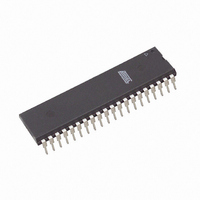ATMEGA16-16PU Atmel, ATMEGA16-16PU Datasheet - Page 224

ATMEGA16-16PU
Manufacturer Part Number
ATMEGA16-16PU
Description
IC AVR MCU 16K 16MHZ 5V 40DIP
Manufacturer
Atmel
Series
AVR® ATmegar
Datasheets
1.ATMEGA16L-8MI.pdf
(26 pages)
2.ATMEGA16L-8MI.pdf
(357 pages)
3.ATMEGA16-16PU.pdf
(358 pages)
4.ATMEGA16-16PU.pdf
(351 pages)
Specifications of ATMEGA16-16PU
Core Processor
AVR
Core Size
8-Bit
Speed
16MHz
Connectivity
I²C, SPI, UART/USART
Peripherals
Brown-out Detect/Reset, POR, PWM, WDT
Number Of I /o
32
Program Memory Size
16KB (8K x 16)
Program Memory Type
FLASH
Eeprom Size
512 x 8
Ram Size
1K x 8
Voltage - Supply (vcc/vdd)
4.5 V ~ 5.5 V
Data Converters
A/D 8x10b
Oscillator Type
Internal
Operating Temperature
-40°C ~ 85°C
Package / Case
40-DIP (0.600", 15.24mm)
Package
40PDIP
Device Core
AVR
Family Name
ATmega
Maximum Speed
16 MHz
Operating Supply Voltage
5 V
Data Bus Width
8 Bit
Number Of Programmable I/os
32
Interface Type
TWI/SPI/USART
On-chip Adc
8-chx10-bit
Number Of Timers
3
Processor Series
ATMEGA16x
Core
AVR8
Data Ram Size
1 KB
Maximum Clock Frequency
16 MHz
Maximum Operating Temperature
+ 85 C
Mounting Style
Through Hole
3rd Party Development Tools
EWAVR, EWAVR-BL
Development Tools By Supplier
ATAVRDRAGON, ATSTK500, ATSTK600, ATAVRISP2, ATAVRONEKIT
Minimum Operating Temperature
- 40 C
A/d Inputs
8-Channel, 10-Bit
Cpu Speed
16 MIPS
Eeprom Memory
512 Bytes
Input Output
32
Interface
JTAG/SPI/UART
Memory Type
Flash
Number Of Bits
8
Package Type
44-pin PDIP
Programmable Memory
16K Bytes
Timers
2-8-bit, 1-16-bit
Voltage, Range
4.5-5.5 V
Controller Family/series
AVR MEGA
No. Of I/o's
32
Eeprom Memory Size
512Byte
Ram Memory Size
1KB
Rohs Compliant
Yes
For Use With
ATSTK600-TQFP44 - STK600 SOCKET/ADAPTER 44-TQFPATSTK600-DIP40 - STK600 SOCKET/ADAPTER 40-PDIP770-1007 - ISP 4PORT ATMEL AVR MCU SPI/JTAGATAVRISP2 - PROGRAMMER AVR IN SYSTEMATJTAGICE2 - AVR ON-CHIP D-BUG SYSTEMATSTK500 - PROGRAMMER AVR STARTER KIT
Lead Free Status / RoHS Status
Lead free / RoHS Compliant
Available stocks
Company
Part Number
Manufacturer
Quantity
Price
Company:
Part Number:
ATMEGA16-16PU
Manufacturer:
Atmel
Quantity:
140
- ATMEGA16L-8MI PDF datasheet
- ATMEGA16L-8MI PDF datasheet #2
- ATMEGA16-16PU PDF datasheet #3
- ATMEGA16-16PU PDF datasheet #4
- Current page: 224 of 351
- Download datasheet (3Mb)
On-chip Debug Specific
JTAG Instructions
PRIVATE0; $8
PRIVATE1; $9
PRIVATE2; $A
PRIVATE3; $B
224
ATmega16(L)
•
•
A debugger, like the AVR Studio, may however use one or more of these resources for
its internal purpose, leaving less flexibility to the end-user.
A list of the On-chip Debug specific JTAG instructions is given in “On-chip Debug Spe-
cific JTAG Instructions” on page 224.
The JTAGEN Fuse must be programmed to enable the JTAG Test Access Port. In addi-
tion, the OCDEN Fuse must be programmed and no Lock bits must be set for the On-
chip Debug system to work. As a security feature, the On-chip Debug system is disabled
when any Lock bits are set. Otherwise, the On-chip Debug system would have provided
a back-door into a secured device.
The AVR JTAG ICE from Atmel is a powerful development tool for On-chip Debugging
of all AVR 8-bit RISC Microcontrollers with IEEE 1149.1 compliant JTAG interface. The
JTAG ICE and the AVR Studio user interface give the user complete control of the inter-
nal resources of the microcontroller, helping to reduce development time by making
debugging easier. The JTAG ICE performs real-time emulation of the microcontroller
while it is running in a target system.
Please refer to the Support Tools section on the AVR pages on www.atmel.com for a full
description of the AVR JTEG ICE. AVR Studio can be downloaded free from Software
section on the same web site.
All necessary execution commands are available in AVR Studio, both on source level
and on disassembly level. The user can execute the program, single step through the
code either by tracing into or stepping over functions, step out of functions, place the
cursor on a statement and execute until the statement is reached, stop the execution,
and reset the execution target. In addition, the user can have an unlimited number of
code breakpoints (using the BREAK instruction) and up to two data memory break-
points, alternatively combined as a mask (range) Break Point.
The On-chip Debug support is considered being private JTAG instructions, and distrib-
uted within ATMEL and to selected third party vendors only. Instruction opcodes are
listed for reference.
Private JTAG instruction for accessing On-chip Debug system.
Private JTAG instruction for accessing On-chip Debug system.
Private JTAG instruction for accessing On-chip Debug system.
Private JTAG instruction for accessing On-chip Debug system.
2 single Program Memory Break Points + 1 Program Memory Break Point with mask
(“range Break Point”)
2 single Program Memory Break Points + 1 Data Memory Break Point with mask
(“range Break Point”)
2466J–AVR–10/04
Related parts for ATMEGA16-16PU
Image
Part Number
Description
Manufacturer
Datasheet
Request
R

Part Number:
Description:
Manufacturer:
Atmel Corporation
Datasheet:

Part Number:
Description:
IC AVR MCU 16K 16MHZ 5V 44TQFP
Manufacturer:
Atmel
Datasheet:

Part Number:
Description:
IC AVR MCU 16K 16MHZ 5V 44-QFN
Manufacturer:
Atmel
Datasheet:

Part Number:
Description:
MCU AVR 16K FLASH 16MHZ 44-QFN
Manufacturer:
Atmel
Datasheet:

Part Number:
Description:
IC AVR MCU 16K 16MHZ COM 40-DIP
Manufacturer:
Atmel
Datasheet:

Part Number:
Description:
IC AVR MCU 16K 16MHZ COM 44-QFN
Manufacturer:
Atmel
Datasheet:

Part Number:
Description:
IC AVR MCU 16K 16MHZ IND 40-DIP
Manufacturer:
Atmel
Datasheet:

Part Number:
Description:
IC AVR MCU 16K 16MHZ IND 44-QFN
Manufacturer:
Atmel
Datasheet:

Part Number:
Description:
IC AVR MCU 16K 16MHZ IND 44-TQFP
Manufacturer:
Atmel
Datasheet:

Part Number:
Description:
IC MCU 8BIT 16KB FLASH 44TQFP
Manufacturer:
Atmel
Datasheet:

Part Number:
Description:
MCU AVR 16K FLASH 16MHZ 44-TQFP
Manufacturer:
Atmel
Datasheet:

Part Number:
Description:
IC AVR MCU 16K 16MHZ COM 44-TQFP
Manufacturer:
Atmel
Datasheet:

Part Number:
Description:
IC MCU AVR 16K 5V 16MHZ 44-TQFP
Manufacturer:
Atmel
Datasheet:











